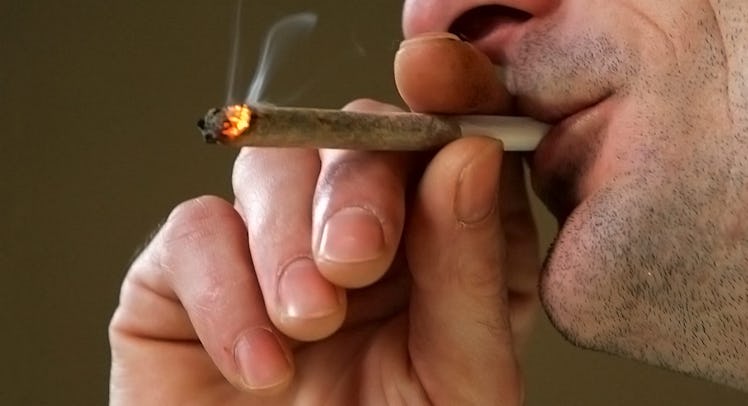Smoking Weed With Baby Boomer Parents Is A Bad Idea
Where there's smoke there's fire.

As marijuana becomes legal in more states and more available—legally or not—to the sons and daughters of former hippies, the prospect of getting high with mom or dad has ceased to be a pipe dream or a taboo. Weed has become part of adult culture and, by the transitive property, become part of American family culture. New grandpas are scoring nugs off of new dads. Whether or not that represents a problem or progress is largely a matter of perspective, but there is an upshot to the trend that is definitely worrisome: Baby Boomers can’t hang.
It’s not totally their fault. Research out of the American Chemical Society has shown that many today’s THC-rich pot strains are 20 percent more potent than what was available 30 years ago. Marijuana is, in short, a significantly different drug than it once was and, thanks to the vaporizer, one consumed far more efficiently. Has this scared boomers away? Absolutely not. Studies show that between 2006 and 2013 marijuana use among adults 50 and older increased by 71 percent and use for those 65 and older more than doubled. This has understandably produced a perfect storm of old people asking their adult children if they’re undercover cops.
For boomers who smoked in the late sixties and early seventies, marijuana is a nostalgic thing. But bodies change over the decades and so does susceptibility to mind-altering substances. Many Allman Brothers fans are just seasoned and confident enough to smoke themselves into a bad place. This can be funny—watching the executive Vice President of an insurance company eat a bag of Fritos is objectively hilarious—but it can also create problems. People have filters for a reason. Old people, who blurt stuff out anyways due to frontal lobe degeneration, need them.
Recently, my mother got high and made fun of my “weird looking” hands for 30 minutes before explaining to me in some detail how I was conceived. The conversation not only ruined waterbeds for the rest of my life, but made me feel insecure about a part of myself I’d never thought to hate before. I’d wanted our smoking session to be a bonding event. It wasn’t. It was fun and kind of funny, but did nothing to bring us closer.
Bonding isn’t always about honesty and disclosure. Often, it’s about intelligent compromise and empathy. I regretted passing the joint.
I’m not the first to have that feeling. “I shouldn’t have smoked up my parents,” is an increasingly common refrain among people in their thirties. And with that sentiment come the horror stories. My favorite? A friend got high with his dad, who then proceeded to text his mom, came down hard from the experience. It sounds fine, sure, but the friend’s parents were divorced and not on speaking terms.
There are some obvious workarounds to keep an intergenerational high mellow. The only catch? They don’t really work. Explaining to an older person that marijuana is much stronger than it used to be incentivizes the wrong behavior—a long, dominance-asserting pull—or is simply meaningless. People who haven’t smoked in a long time frequently don’t remember how to moderate consumption or are simply using technologies to smoke that they are unfamiliar with. And don’t think that edibles solve the problem. Sure, they allow for some regulation of dosage, but the delay between swallowing and feeling anything creates a problematic dynamic. A 65-year-old bracing themselves for a high is likely to become worried or neurotic before any chemicals hit a neurological pathway.
There are real risks as well. Marijuana can cause blood pressure and heart rates to spike, as well as increase the risk of strokes, mini-strokes, heart attacks and heart disease. And of course, there’s the danger of weed interacting with other medications, plus a raised the risk of falling and harshing the vibe.
But the biggest argument against smoking with parents is that it’s an ineffective means to a noble end. With exceptions, people smoke with Grandma because they think it will be a funny bonding experience and because it alters the parent-child dynamic, providing a shortcut to equal footing. But what’s the point in that? At the end of the day, mom and dad remain mom and dad. A brief peak behind the veil won’t change an overall dynamic and likely won’t offer real insight either. People are who they are when they’re sober. What did I learn about my mother? She can put away two boxes of granola bars. It was not a valuable lesson.
This article was originally published on